Photographs: Reuters M R Venkatesh
The media advisors of the prime minister must be credited, at least for this one.
They have been more or less successful till date in Teflon-coating the image of prime minister from the endless allegations of corruption that seems to rock his government.
Most critics, commentators or TV anchors virtually begin his or her criticism of the government by first conceding that the prime minister is 'personally' an honest person.
This repeated assertion by the vast sections of the media seems to have its desired effect even on the political adversaries of the prime minister, both within the Congress party and outside.
. . .
The PM is an honest man and a brilliant economist too!
Photographs: Reuters
Invariably, in all debates, they readily concede that the prime minister is an honest man, while simultaneously attacking his Cabinet colleagues for their acts of omissions and commissions.
Madhu Purnima Kishwar captured this paradox brilliantly in her article, 'Honestly Speaking', in Outlook. She states, "I fail to understand why almost every commentator, every TV anchor, every editorial writer feels compelled to pay ritual obeisance to the 'personal honesty and integrity' of Dr Manmohan Singh."
Importantly, she adds, "Corruption is not only about personally accepting monetary bribes and stacking them away in hidden bank accounts overseas, buying benami properties or accepting diamond sets for your wife. Corruption can come in insidious avatars, such as knowingly turning a blind eye to the misuse of the entire machinery of governance to serve private ends of a few individuals, even to the point of endangering national security."
And therein lays the rub. Increasingly questions are being raised as to why the prime minister turned a Nelson's eye to numerous instances of corruption even when they were brought to his notice, sometimes by his own party members?
. . .
The PM is an honest man and a brilliant economist too!
Photographs: Reuters
Is there a tacit understanding between the prime minister and some of his Cabinet colleagues -- you continue to support me and I will be unmindful of your loot?
Crony capitalism and its links with politics
But there is another dimension to this entire debate. Inadvertently, by repeatedly telling us that the prime minister is personally honest, his media managers by default have significantly dented the image of the Union Cabinet and the credibility of the government of India.
Increasingly the 'personally honest' prime minister seems to be like a pontiff amongst robber barons. Who said you are known by the company you keep?
More to the point, coalition politics of the past two decades or so has given rise to something sinister. While the spokespersons of every political party in power repeatedly assert that Cabinet formation is the sole prerogative of the prime minister, even a layman would know that, in the Indian context, it is in effect a bargain between political groups representing various economic interests.
. . .
The PM is an honest man and a brilliant economist too!
Photographs: Reuters
Economists term this marriage of convenience between politics and economics as crony capitalism -- a situation where business interests of the high and the mighty are interlinked, intertwined and integrated to political interests.
Delivering a lecture while inaugurating the Institute for Studies in Industrial Development, Manmohan Singh observed: "I was struck recently by a comment in the media that most of the billionaires among India's top business leaders operate in oligopolistic markets, and in sectors where the government has conferred special privileges on a few."
The prime minister went on to add several rhetorical questions on this fascinating subject. "This sounds like crony capitalism. Are we encouraging crony capitalism? Is this a necessary but transient phase in the development of modern capitalism in our country? Are we doing enough to protect consumers and small businesses from the consequences of crony capitalism? Have we, in the name of protecting them, encouraged crony capitalism? Do we have a genuine level playing field for all businesses? What should be done to inject a greater degree of competitiveness in the industrial sector?"
Good questions. In fact, brilliant ones! But what should be more interesting is the timing of these questions -- this lecture was delivered on the first of May, 2007. This, more or less, coincided with the ouster of Dayanidhi Maran from the Union Cabinet for the first time, not on charges of crony capitalism, but ostensibly on account of a bitter family feud within the DMK family.
. . .
The PM is an honest man and a brilliant economist too!
Photographs: Reuters
Maran, as the reader would know, was subsequently replaced by A Raja following the intervention of the DMK patriarch M Karunanidhi. So much for the prerogative of the prime minister to appoint ministers to his Cabinet in this era of coalition!
But the issue is not merely to choosing ministers or dropping them under coalition compulsions or family feuds.
Crucially, it applies to securing portfolios of 'commercial interests' (and not political interests) of political party, its leaders or bigwigs.
Recall the Nira Radia tapes. Raja was not anxious to know whether he would become a Cabinet minister; he was anxious to know whether he would become the telecommunication minister. The reason for the same is obvious.
. . .
The PM is an honest man and a brilliant economist too!
Photographs: Reuters
India is in its nascent stage of liberalisation. Much as the role of the government is waning in the economic sphere, the fact remains that the government is and will continue to be entrusted with the task of policy formulation.
What better idea than to capture the policy formulation space for the benefit of personal business interests or to ensure that it is used to kill competition?
A famous example in the United States was the Interstate Commerce Commission, which was established as early as in 1887 to regulate the railroad 'robber barons'.
Instead, it quickly became controlled by the railroads, which set up a permit system that was used to deny access to new entrants and functionally legalised price fixing!
. . .
The PM is an honest man and a brilliant economist too!
Photographs: Reuters
Given the political paradigm prevailing in India, it is extremely tempting for players to enter the policy formulation space and use it against business competitors. People enter politics with a clear intention to further their economic interests, not otherwise.
In the process, increasingly, the Union Cabinet resembles diverse business interests (beginning A for Agriculture to U for Urban Affairs) headed, of course, by an honest prime minister.
Maran and crony capitalism
What is missed in the melee by the media managers of the prime minister is the fact that there is nothing 'personal' in public life. Either one is honest or dishonest in public life with virtually no third alternative.
This compartmentalisation of honesty and circumscribing it as personal is neither feasible in public life nor desirable.
. . .
The PM is an honest man and a brilliant economist too!
Photographs: Reuters
Nothing illustrates this paradigm better than the latest Maran-Maxis imbroglio. It may be recalled that when Maran was appointed to the Union Cabinet as the telecommunications minister eyebrows were raised.
By 2006 it was public knowledge that Maran was attempting to use his office and derail the business plan of Tata Group as the Sun group (owned by his brother) was competing with the Tatas.
L'affaire Maxis which ultimately led to the resignation of Maran from the Union Cabinet last week is seen by many as textbook definition of crony capitalism. The allegation that Maran denied spectrum to Aircel and thereby put brakes on its business expansion plans is as old as the Sun (pun unintended).
Disillusioned by the turn of events, the then owner of Aircel divested his stakes in favour of Maxis.
. . .
The PM is an honest man and a brilliant economist too!
Photographs: Reuters
Once Aircel changed hands, it is alleged, spectrum hitherto denied was instantly made available to Aircel. And in return for the favour, the Maxis group is rumored to have invested into certain Sun group companies (which even to this date are making losses) at exorbitant premiums.
Naturally questions arise. Was the prime minister aware of Maran's, and by extension his brother's, business interests? Was he aware as to the allegations made by several business groups -- available in public domain -- as to how Maran misused his official position to derail business plan of rival business groups?
In fact, as pointed out, Maran continued to occupy the office of Union telecommunications minister till May 2007. He resigned, not because he lost the confidence and backing of the prime minister, but because of the family feud.
The sequence of events during his term in office, however, suggests that crony capitalism flourished then. And it is precisely in these situations the prime minister should have stopped lamenting about crony capitalism through lectures and demonstrated his understanding of economics and personal honesty through direct actions and decisive interventions. Yet, he chose not to.
. . .
The PM is an honest man and a brilliant economist too!
Photographs: Reuters
Having lost several chances to 'publicly' demonstrate his 'personal honesty', the prime minister's image managers face a Hobson's choice now -- if they do nothing, they are accused of apathy and if they do something, it is pure hyperbole.
Seems like quite a fall for a man who is the architect of the economic reforms in India and has been largely instrumental in dismantling the license-quota-permit raj of the pre-liberalisation era.
PS: As questions arise on the prime minister's understanding of economics, his media managers probably need to attempt one more: the prime minister is a brilliant economist too!
The author is a Chennai-based Chartered Accountant. Comments can be sent to mrv@mrv.net.in

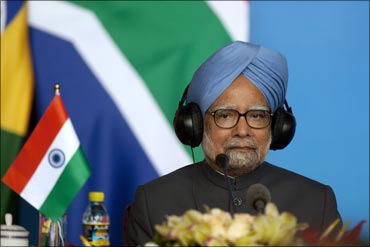

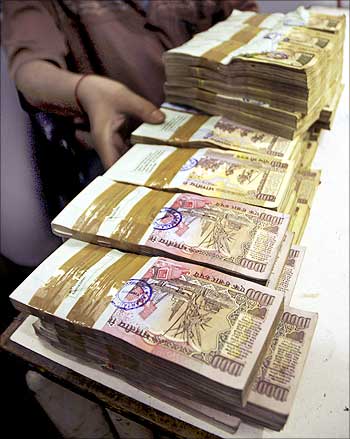
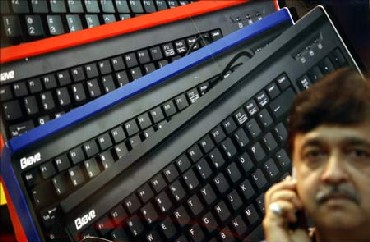
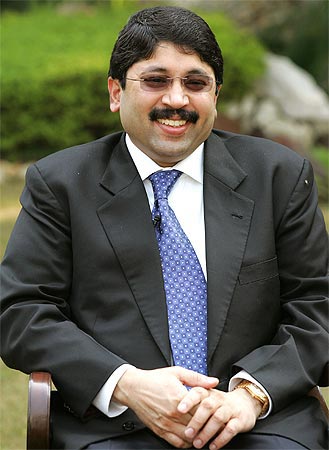
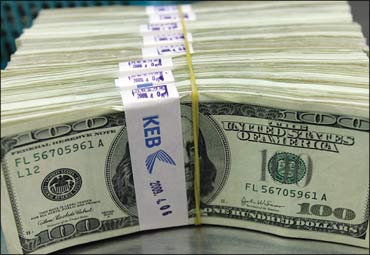

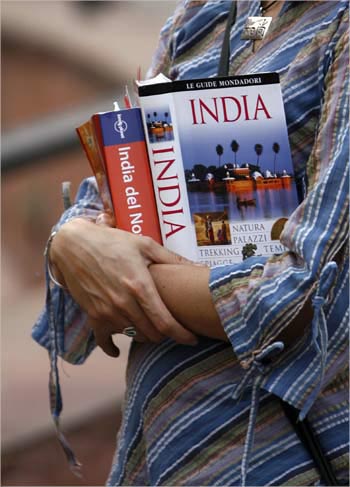
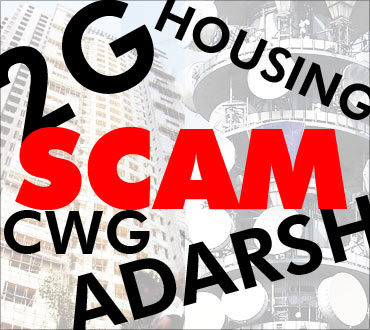

article